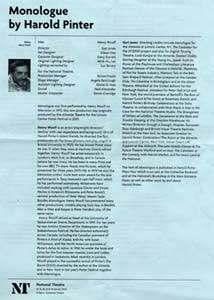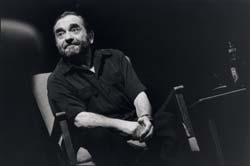

|
| Monologue
(2002) Royal National Theatre (Cottesloe Theatre) |
||||
Directed by Gari Jones Cast Haunting miniature mixes memory
and desire THE National Theatre is mounting a mini Pinter Festival around its revival of his 1975 play, No Man's Land. Next month (Feb 8 and 11) there will be two strongly cast programmes of his sketches, including the world premiere of Press Conference, starring the great man himself. And to set the ball rolling, his old mucker, Henry Woolf, who has known Pinter since they were at Hackney Downs School together, is starring in the rarely performed Monologue at the National's Cottesloe, which was first performed by Woolf on television in 1973. Pinter's reputation is so high these days that if he volunteered to stand on a stage for half an hour and cough at the audience - menacingly and enigmatically, of course, and with frequent pauses - I suspect a bevy of artistic directors would be desperate to sign him up. Nothing by the Master is now too insignificant to merit serious scrutiny. Yet though there is something faintly absurd about the awed reverence in which Pinter is currently held, and though Monologue, lasting a mere 27 minutes, is unmistakeably a minor piece, I find myself strangely haunted by it. It was written between Old Times (1971) and No Man's Land (1975) and like those more substantial works, puts one in mind of TS Eliot's potent phrase in The Waste Land about "mixing memory and desire". The speaker, called only Man, inhabits one of Pinter's shabby rooms, and spends the play addressing another man who, it finally turns out, might be his brother. But though Woolf pours his companion beer, and tells him how much he enjoys "this kind of exchange, this class of mutual reminiscence", the armchair he addresses is empty and the character on stage is alone. Moreover, there are hints that he might be institutionalised. As in so much of Pinter's finest work, apparent affability is mixed with suspicion and rivalry. Even when proposing a harmless game of ping-pong, the man threatens his opponent with a "categorical thrashing", and if the play were anonymous you would know it was Pinter's by that phrase alone.
Talk of sport and literature gives
way to reminiscences of romance. It emerges that the speaker loved
a woman, who was, in Pinter's now non-PC parlance, as "black as
the ace of spades", but that she transferred her favours to the
invisible occupant of the chair. And the play is at its best when
it achieves a kind of telegrammatic poetry of sharply recollected
love - a walk through long grass to a pub, a farewell at Paddington
amid the sound of steam. It's potently evocative stuff. Woolf, short,
plump and bearded, bears an astonishing resemblance to a garden
gnome. When he sits in a chair, he has to perch on the edge so that
his feet will reach the floor, and though apparently benign, there
is a touch of the malign in his raspingly voiced monologue. The
strongest impression though is of regret, of an obsessive hurt that
refuses to fade. Gari Jones's production includes a moment - not
specified in the text - when Woolf plays These Foolish Things, that
great song of remembered love, on his cassette player, and the actor's
face seems to convulse with the pain of overwhelming memory. And
in the final moments, the speaker, who implausibly claims to have
put the past behind him, betrays a yearning for family, for children,
for what might have been, that is so intense that he suddenly seems
to be persuaded of its reality. It is a heart-catching moment in
a subtle, highly suggestive play that packs more into half an hour
than many dramatists manage in three. |
||||
| Back to plays Main Page |

